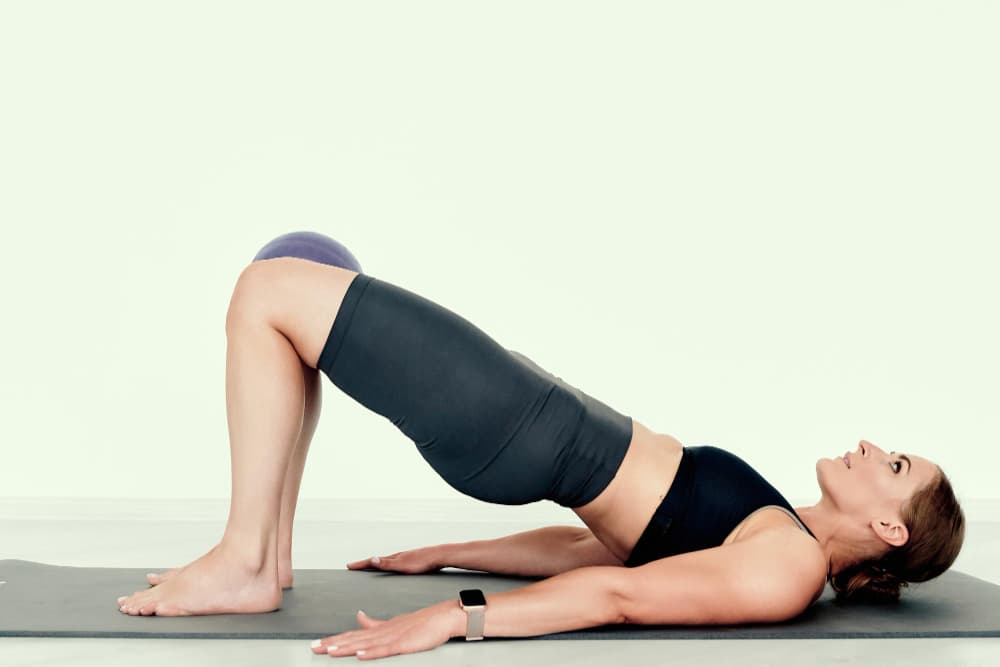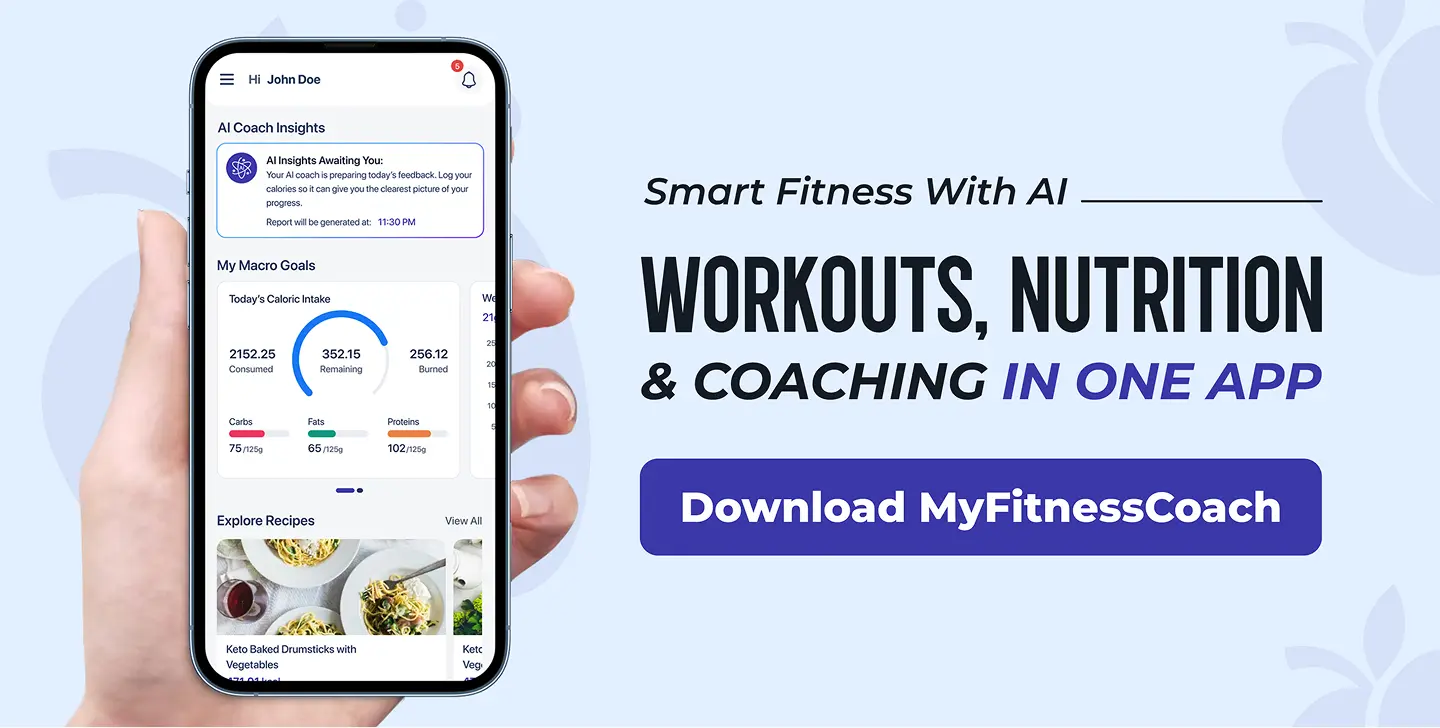Single Leg Hip Thrust | Benefits, Form, and Complete Workout Guide

MyFitnessCoach
October 30, 2025
When it comes to building strong, toned glutes, few exercises can compete with the single-leg hip thrust. It’s one of the best moves for activating your glutes, improving balance, and enhancing lower body strength, all using your body weight. Whether you’re at the gym or at home, mastering this exercise can completely transform your lower body.
In this article, we’ll explore what the single-leg hip thrust is, how to perform it correctly, common mistakes to avoid, its benefits, and how to integrate it into your workout routine, even through an app like MyFitnessCoach, which helps you track your progress, set goals, and stay consistent.
Muscles Worked During a Single Leg Hip Thrust
The single-leg hip thrust works multiple muscle groups at once, making it one of the best exercises for total lower-body strength and stability.
1. Gluteus Maximus
The main target of the exercise, the gluteus maximus, is responsible for hip extension and power. It helps shape your glutes and improves athletic performance.
2. Hamstrings
Your hamstrings assist in extending the hips and stabilizing your body during the movement.
3. Core Muscles
Keeping your balance while lifting one leg activates your core muscles, including the rectus abdominis and obliques, for improved stability.
4. Quadriceps
Although not the primary mover, your quads help control the lowering phase of the thrust.
5. Lower Back
Your lower back muscles engage to maintain proper posture and prevent collapsing during the movement.
How to Do a Single Leg Hip Thrust Correctly
Perfect form is everything when it comes to getting results and preventing injury. Here’s a simple step-by-step guide to performing the single-leg hip thrust correctly.
Step 1: Set Up
- Sit on the ground with your upper back resting against a bench or sofa.
- Bend your knees and place your feet flat on the floor, hip-width apart.
- Keep your hands on your hips or rest them lightly on the bench for stability.
Step 2: Lift One Leg
- Extend one leg straight out in front of you so it’s parallel to the ground.
- Keep your core tight and your chin slightly tucked.
Step 3: Drive Through the Heel
- Push through the heel of your grounded foot.
- Lift your hips toward the ceiling until your thigh and torso form a straight line.
- Squeeze your glutes hard at the top for one to two seconds.
Step 4: Lower Slowly
- Lower your hips back down under control without letting them touch the ground completely.
- Repeat the movement for 10–12 reps on one leg before switching sides.
Common Mistakes to Avoid
Even though the single-leg hip thrust looks simple, many people make small mistakes that reduce effectiveness or cause discomfort. Avoid these common errors:
1. Overarching the Back
Lifting too high or letting your lower back arch can strain your spine. Always keep your ribs down and your core tight.
2. Not Engaging the Glutes
If you’re pushing with your lower back or quads, you’re missing the point. Focus on squeezing your glutes at the top of the movement.
3. Uneven Movement
Your hips should rise evenly. If one side drops, it means you’re not engaging your weaker glute properly.
4. Rushing the Reps
Performing the exercise too fast reduces muscle tension. Slow and controlled movements give the best results.
Benefits of the Single-Leg Hip Thrust
The single-leg hip thrust is more than just a glute exercise. It offers full-body benefits that go beyond aesthetics.
1. Builds Stronger, Rounder Glutes
This exercise isolates one side at a time, ensuring your glutes are evenly developed for better symmetry and strength.
2. Improves Athletic Performance
Whether you play sports or simply love to move, stronger glutes translate to better sprinting, jumping, and overall power.
3. Corrects Muscle Imbalances
Most people have a dominant leg. The single-leg hip thrust helps correct these imbalances and improves coordination.
4. Enhances Core Stability
Balancing on one leg forces your abs to engage, leading to better posture and overall stability.
5. Strengthens the Lower Back
When performed correctly, it helps reinforce lower back muscles and reduces the risk of injury from other exercises.
Variations of the Single-Leg Hip Thrust
Once you’ve mastered the basic version, try these variations to increase intensity or challenge your muscles in new ways.
1. Weighted Single-Leg Hip Thrust
Add a dumbbell or barbell across your hips for extra resistance.
2. Elevated Foot Single-Leg Hip Thrust
Place your grounded foot on a step or platform to increase the range of motion and difficulty.
3. Resistance Band Hip Thrust
Wrap a resistance band around your thighs for added glute activation.
4. Pause Reps
Hold the top position for 3–5 seconds before lowering. This builds mind-muscle connection and power.
5. Slow Eccentric Reps
Take 3–4 seconds to lower your hips back down. This increases time under tension and boosts muscle growth.
How to Add Single-Leg Hip Thrusts to Your Routine
To get the best results, include single-leg hip thrusts 2–3 times per week as part of your lower-body or glute-focused workout.
Here’s a simple structure you can follow:
Beginner:
- 3 sets × 8–10 reps per leg (bodyweight only)
Intermediate:
- 4 sets × 10–12 reps per leg (with resistance bands)
Advanced:
- 4–5 sets × 12–15 reps per leg (add weights)
You can track your progress easily using the MyFitnessCoach app. It allows you to log your sets, reps, and weights so you can see improvements over time.
Tracking Your Progress with the MyFitnessCoach App
The MyFitnessCoach app is the perfect companion for anyone who wants to stay consistent with workouts like the single-leg hip thrust. Here’s how it helps:
1. Personalized Workout Plans
Get tailored glute and lower body routines that include the single-leg hip thrust, based on your fitness level.
2. Progress Tracking
Log your workouts, measure progress, and see your improvement over time with detailed performance stats.
3. Step and Calorie Tracking
Track your daily steps, burned calories, and body stats, everything you need to support muscle gain and fat loss.
4. Nutrition and Diet Support
Use the food logger to track protein, carbs, and fats, ensuring you eat the right nutrients to grow muscle.
5. AI-Insights
Receive AI-powered feedback on your workouts and nutrition habits to help you optimize your training.
With MyFitnessCoach, you can not only perform effective exercises like the single-leg hip thrust but also monitor your entire fitness journey from your phone.
Tips for Faster Results
To see the best results from the single-leg hip thrust, follow these simple but powerful tips:
- Focus on Form Over Weight: Never compromise technique for added resistance.
- Activate Before Lifting: Warm up your glutes with glute bridges or banded walks.
- Progress Gradually: Increase reps or resistance as your strength improves.
- Stay Consistent: Train your glutes 2–3 times a week.
- Eat Protein-Rich Meals: Nutrition is key for muscle recovery and growth, something the MyFitnessCoach app helps you plan.
Why the Single Leg Hip Thrust Is a Must-Have Exercise
If your goal is to build a stronger lower body, improve balance, and enhance athletic ability, the single-leg hip thrust should be a staple in your routine. It’s beginner-friendly, requires minimal equipment, and delivers noticeable results when done consistently.
Paired with smart tracking, proper nutrition, and a structured workout plan, all available through the MyFitnessCoach app, this simple movement becomes a powerhouse for building glutes, strength, and stability.
Final Thoughts
The single-leg hip thrust might look simple, but it’s a powerhouse movement that builds glute strength, improves stability, and enhances your entire lower body performance. Whether your goal is muscle building, toning, or athletic improvement, this exercise delivers real results.

And if you want to make your fitness journey easier, download the MyFitnessCoach app today. With personalized workouts, progress tracking, diet insights, and step challenges, it helps you stay consistent and achieve your goals, one thrust at a time.
Similar Articles
Stay informed with these similar articles.

MyFitnessCoach
May 9, 2025
What Sweaty Kneecaps Means and 5 Tips to Prevent It?
Ever noticed your knees getting sweaty for no reason? You’re not alone. Sweaty kneecaps might seem odd, but they’re more common than you think.

MyFitnessCoach
March 6, 2025
Arm Swing Exercise: Effective Way to Boost Your Fitness
When it comes to fitness, we often think of intense workouts, heavy lifting, or long runs. But what if I told you that a simple exercise like arm swings could be just as effective in improving your overall fitness? Arm swing exercises are easy to do, require no equipment, and can be done anywhere. Whether you're a beginner or a fitness enthusiast, arm swings can help you improve flexibility, strength, and even cardiovascular health. In this article, we’ll explore the benefits of arm swing exercises, how to do them correctly, and how you can incorporate them into your fitness routine using the MyFitnessCoach app.

MyFitnessCoach
February 24, 2025
Best Deodorant for Athletes: Stay Fresh During Your Workouts
When you're an athlete or someone who loves to stay active, staying fresh and odor-free is a top priority. Whether you're hitting the gym, running a marathon, or sweating it out during a high-intensity workout, the right deodorant can make all the difference. But with so many options available, how do you choose the best deodorant for athletes? In this article, we’ll break down everything you need to know about finding the perfect deodorant to keep you feeling confident and fresh, no matter how intense your workout gets. Plus, we’ll show you how the MyFitnessCoach app can help you stay on top of your fitness game.
